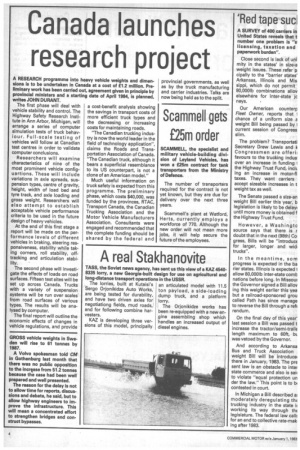'Red tape sucl
Page 6

If you've noticed an error in this article please click here to report it so we can fix it.
A SURVEY of 400 carriers in United States reveals that t number one problem is "s licensing, taxation and• paperwork burden".
Close second is lack of uni mity in the states' in size-a weight issues. These refer p cipally to the "barrier states' Arkansas, Illinois and Mis sippi, which do not permit 80,000lb combinations alloy elsewhere for inter-state jc neys.
Our American counterp Fleet Owner, reports that I chance of a uniform size a weight Bill being passed by I current session of Congress slim.
The problem? Transportati Secretary Drew Lewis and k Congressmen are offerii favours to the trucking indus. over an increase in funding the Highway Trust Fund, inck ing an increase in motor-fl taxes. They want carriers accept sizeable increases in t weight tax as well.
The Senate passed a size-an weight Bill earlier this year, b legislation is likely to be delay( until more money is obtained f the Highway Trust Fund.
However, a Wash ingto source says that there is r doubt that in the next (98th) Col gress, Bills will be "introducE for larger, longer and widi trucks".
In the meantime, som progress is expected in the ba rier states. Illinois is expected 1 allow 80,000lb inter-state comb nations before long. In Missour the Governor signed a Bill alloy ing this weight earlier this yea but a railroad-sponsored grou called Path has since manage to reverse the Bill through a ref( rend urn.
On the final day of this year' last session a Bill was passed t increase the tractor/semi-traile length maximum to 60ft, in was vetoed by the Governor.
And according to Arkansa Bus and Truck Association weight Bill will be introduce there in January, 1983. The pre sent law is an obstacle to inter state commerce and also is sail to violate "equal protection un der the law." This point is to IN contested in court.
In Michigan a Bill described ar moderately deregulating th( trucking industry in the state working its way through th( legislature. The federal law call( for an end to collective rate-making after 1983.
















































































